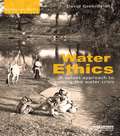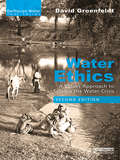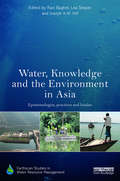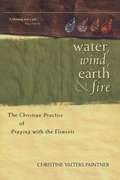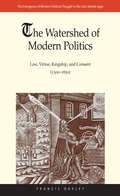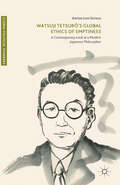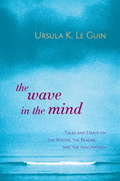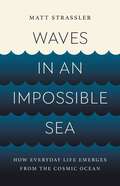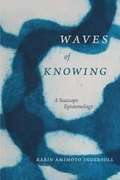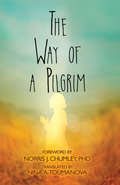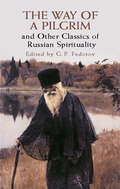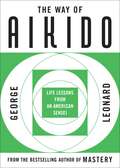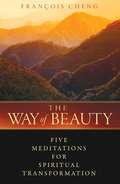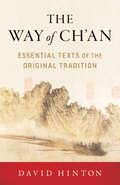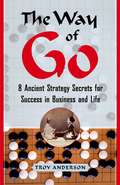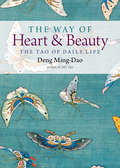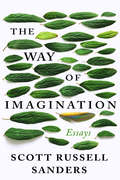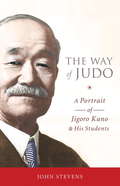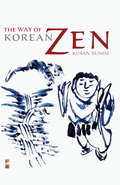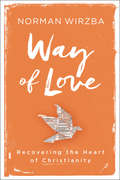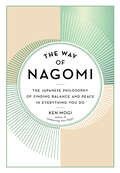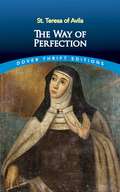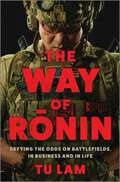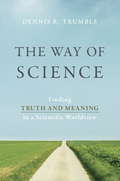- Table View
- List View
Water Ethics: A Values Approach to Solving the Water Crisis
by David GroenfeldtThis book introduces the idea that ethics are an intrinsic dimension of any water policy, program, or practice, and that understanding what ethics are being acted out in water policies is fundamental to an understanding of water resource management. Thus in controversies or conflicts over water resource allocation and use, an examination of ethics can help clarify the positions of conflicting parties as preparation for constructive negotiations. The author shows the benefits of exposing tacit values and motivations and subjecting these to explicit public scrutiny where the values themselves can be debated. The aim of such a process is to create the proverbial 'level playing field', where values favoring environmental sustainability are considered in relation to values favoring short-term exploitation for quick economic stimulus (the current problem) or quick protection from water disasters (through infrastructure which science suggests is not sustainable). The book shows how new technologies, such as drip irrigation, or governance structures, such as river basin organizations are neither "good" nor "bad" in their own right, but can serve a range of interests which are guided by ethics. A new ethic of coexistence and synergies with nature is possible, but ultimately depends not on science, law, or finances but on the values we choose to adopt. The book includes a wide range of case studies from countries including Australia, India, Philippines, South Africa and USA. These cover various contexts including water for agriculture, urban, domestic and industrial use, the rights of indigenous people and river, watershed and ecosystem management.
Water Ethics: A Values Approach to Solving the Water Crisis (Earthscan Water Text)
by David GroenfeldtFully revised and updated, this second edition of Water Ethics continues to consolidate water ethics as a key dimension of water-related decisions. The book introduces the idea that ethics are an intrinsic dimension of any water policy, program, or practice, and that understanding what ethics are being acted out in water policies is fundamental to an understanding of water resource management. Alongside updated references and the introduction of discussion questions and recommended further reading, this new edition discusses in depth three significant developments since the publication of the first edition in 2013. The first is the growing awareness of the climate crisis as an existential threat, and associated concern about adaptive strategies for sustainable water management and ways of using water management for climate mitigation (e.g., practically through agricultural soil management and conceptually through ethics awareness). Second, there has been increased clarity among the religious community, Indigenous leaders, and progressive academics that ethics needs to become an arena for application and action (e.g., the Vatican encyclical Laudato Si, protests at Standing Rock and Flint, Michigan, in the US, and climate demonstrations worldwide). Thirdly, there have been new normative water standards ranging from "water stewardship" (industry initiative), water charters (Berlin) and the on-going initiative to develop a global water ethics charter. Drawing on case studies from countries including Australia, India, the Philippines, South Africa, and the United States, this textbook is essential reading for students of environmental ethics and water governance and management.
Water, Knowledge and the Environment in Asia: Epistemologies, Practices and Locales (Earthscan Studies in Water Resource Management)
by Ravi Baghel Lea Stepan Joseph K.W. HillThe dramatic transformation of our planet by human actions has been heralded as the coming of the new epoch of the Anthropocene. Human relations with water raise some of the most urgent questions in this regard. The starting point of this book is that these changes should not be seen as the result of monolithic actions of an undifferentiated humanity, but as emerging from diverse ways of relating to water in a variety of settings and knowledge systems. With its large population and rapid demographic and socioeconomic change, Asia provides an ideal context for examining how varied forms of knowledge pertaining to water encounter and intermingle with one another. While it is difficult to carry out comprehensive research on water knowledge in Asia due to its linguistic, political and cultural fragmentation, the topic nevertheless has relevance across boundaries. By using a carefully chosen selection of case studies in a variety of locations and across diverse disciplines, the book demonstrates commonalities and differences in everyday water practices around Asia while challenging both romantic presumptions and Eurocentrism. Examples presented include class differences in water use in the megacity of Delhi, India; the impact of radiation on water practices in Fukushima, Japan; the role of the King in hydraulic practices in Thailand, and ritual irrigation in Bali, Indonesia.
Water, Wind, Earth, and Fire: The Christian Practice of Praying with the Elements
by Valters Christine PaintnerOrganized around The Canticle of the Creatures by St. Francis of Assisi, Water, Wind, Earth, and Fire is the first book to consider the ways in which praying with the natural elements can enliven Christian spiritual life. Paintner offers concrete suggestions and guided contemplative exercises; for instance, she suggests that readers take time to ¿watch the sunrise or sunset and breathe in the beauty of the fiery sky. Contemplate what those beginnings and endings have to say in your own life. ¿ Readers benefit from Paintner¿s extensive training in theology and Benedictine spirituality, as well as her unique work in bringing the expressive arts to spiritual direction.
The Watershed of Modern Politics
by Francis OakleyThe concluding volume of Francis Oakley's authoritative trilogy moves on to engage the political thinkers of the later Middle Ages, Renaissance, Age of Reformation and religious wars, and the era that produced the Divine Right Theory of Kingship. Oakley's ground-breaking study probes the continuities and discontinuities between medieval and early modern modes of political thinking and dwells at length on the roots and nature of those contract theories that sought to legitimate political authority by grounding it in the consent of the governed.
Watsuji Tetsurô’s Global Ethics of Emptiness
by Anton Luis SevillaThis book is a rethinking of ethics and socio-political life through the ideas of Watsuji Tetsurô. Can we build a systematic philosophy of morality, society, and politics, not on the basis of identity and ego, but rather on the basis of selflessness? This book explores such an attempt by the leading ethicist of modern Japan. Using concrete examples and contemporary comparisons, and with careful reference to both English and Japanese sources, it guides the reader through Watsuji’s ideas. It engages three contemporary issues in depth: First, how do we approach the moral agent, as an autonomous being or as a fundamentally relational being? Second, is it the individual or the community that is the starting point for politics? And finally, is ethics something that is globally shared or something fundamentally local? This book aims to be an informative and inspiring resource for researchers, students, and laypersons interested in Buddhist thought.
The Wave in the Mind: Talks and Essays on the Writer, the Reader, and the Imagination
by Ursula K. Le GuinJoin Ursula K. Le Guin as she explores a broad array of subjects, ranging from Tolstoy, Twain, and Tolkien to women's shoes, beauty, and family life. With her customary wit, intelligence, and literary craftsmanship, she offers a diverse and highly engaging set of readings. The Wave in the Mind includes some of Le Guin's finest literary criticism, rare autobiographical writings, performance art pieces, and, most centrally, her reflections on the arts of writing and reading.
Waves in an Impossible Sea: How Everyday Life Emerges from the Cosmic Ocean
by Matt StrasslerA theoretical physicist takes readers on an awe-inspiring journey—found in "no other book" (Science)—to discover how the universe generates everything from nothing at all: "If you want to know what's really going on in the realms of relativity and particle physics, read this book" (Sean Carroll, author of The Biggest Ideas in the Universe). In Waves in an Impossible Sea, physicist Matt Strassler tells a startling tale of elementary particles, human experience, and empty space. He begins with a simple mystery of motion. When we drive at highway speeds with the windows down, the wind beats against our faces. Yet our planet hurtles through the cosmos at 150 miles per second, and we feel nothing of it. How can our voyage be so tranquil when, as Einstein discovered, matter warps space, and space deflects matter? The answer, Strassler reveals, is that empty space is a sea, albeit a paradoxically strange one. Much like water and air, it ripples in various ways, and we ourselves, made from its ripples, can move through space as effortlessly as waves crossing an ocean. Deftly weaving together daily experience and fundamental physics—the musical universe, the enigmatic quantum, cosmic fields, and the Higgs boson—Strassler shows us how all things, familiar and unfamiliar, emerge from what seems like nothing at all. Accessible and profound, Waves in an Impossible Sea is the ultimate guide to our place in the universe.
Waves of Knowing: A Seascape Epistemology
by Karin Amimoto IngersollIn Waves of Knowing Karin Amimoto Ingersoll marks a critical turn away from land-based geographies to center the ocean as place. Developing the concept of seascape epistemology, she articulates an indigenous Hawaiian way of knowing founded on a sensorial, intellectual, and embodied literacy of the ocean. As the source from which Kanaka Maoli (Native Hawaiians) draw their essence and identity, the sea is foundational to Kanaka epistemology and ontology. Analyzing oral histories, chants, artwork, poetry, and her experience as a surfer, Ingersoll shows how this connection to the sea has been crucial to resisting two centuries of colonialism, militarism, and tourism. In today's neocolonial context--where continued occupation and surf tourism marginalize indigenous Hawaiians--seascape epistemology as expressed by traditional cultural practices such as surfing, fishing, and navigating provides the tools for generating an alternative indigenous politics and ethics. In relocating Hawaiian identity back to the waves, currents, winds, and clouds, Ingersoll presents a theoretical alternative to land-centric viewpoints that still dominate studies of place-making and indigenous epistemology.
Waves of War: Nationalism, State Formation, and Ethnic Exclusion in the Modern World
by Andreas WimmerWhy did the nation-state emerge and proliferate across the globe? How is this process related to the wars fought in the modern era? Analyzing datasets that cover the entire world over long stretches of time, Andreas Wimmer focuses on changing configurations of power and legitimacy to answer these questions. The nationalist ideal of self-rule gradually diffused over the world and delegitimized empire after empire. Nationalists created nation-states wherever the power configuration favored them, often at the end of prolonged wars of secession. The elites of many of these new states were institutionally too weak for nation-building and favored their own ethnic communities. Ethnic rebels challenged such exclusionary power structures that violated the principle of self-rule, and neighboring governments sometimes intervened into these struggles over the state. Waves of War demonstrates why nation-state formation and ethnic politics are crucial to understand the civil and international wars of the past 200 years.
The Way of a Pilgrim
by Norris J. ChumleyA homeless wanderer, bearing nothing but a knapsack and Bible, sets off to follow St. Paul's advice to "pray without ceasing" in this classic of world spirituality. Written by an anonymous nineteenth-century Russian peasant, it traces his attempts to achieve a greater intimacy with God by chanting the Jesus Prayer ("Lord Jesus Christ, Son of God, have mercy on me").Generations of readers—including seekers of all faiths—began their spiritual lives by following the pilgrim's attempts to discipline his mind toward a constant awareness of God's presence as manifested through Christ's mercy. This exploration of the power of prayer offers people everywhere, in every situation, a starting place on a journey to peace, freedom, and salvation. This edition features a brand-new Foreword by Norris J. Chumley, Ph.D., an Emmy Award winning authority on religion and history.
The Way of a Pilgrim: and Other Classics of Russian Spirituality (Dover Books On Western Philosophy)
by G. P. Fedotov"A valuable treasure of Russian spirituality that theologians, philosophers, and laymen will read with pleasure and delight." — The Personalist.An anonymous nineteenth-century peasant attempts to follow St. Paul's advice to "pray without ceasing," setting out on a pilgrimage with only a Bible, a rosary, and some dried bread. Throughout his travels, he recites the Jesus prayer ("Lord Jesus Christ, have mercy on me"), an invocation reputed to instill a sense of love for all creation. The story of his spiritual education, "The Way of a Pilgrim" ranks among the classics of world spirituality, and its appearance here distinguishes this superb anthology of spiritual works by Russian writers.Clear, scholarly commentaries introduce the texts, which date from the eleventh century to modern times and derive from the lives of saints, ascetic and mystic treatises, and spiritual autobiographies. All the authors — mystics, prophets, rebels, and saints — belonged to the Russian Orthodox Church, and most occupied places of spiritual authority. Their works offer both literary sensibility and compelling examples of intense religious experience. The first such anthology in any language, this volume was hailed upon its original publication as "a gold mine indeed" (Commonweal).
Way of Aikido, The: Life Lessons from an American Sensei
by George LeonardAn insightful and inspiring book for the spiritual seeker, "The Way of Aikido" offers a new way of facing life's challenges.
The Way of Beauty: Five Meditations for Spiritual Transformation
by François ChengFive meditations on the role of beauty in human life and its direct connection with the sacred • Looks at how beauty has the power to elevate and counterbalance the negative side of the reality facing us • Presents the role of beauty in transforming individuals and transforming the world from a Taoist perspective In a time of mindless violence and widespread ecological and natural catastrophes, François Cheng asks if talking about beauty may not seem incongruous even scandalous. Yet this is actually the most appropriate time to revisit a subject that was a philosophical mainstay for millennia. The power of beauty to elevate and transcend counterbalances the negative side of the reality facing us. As John Keats noted in “Ode on a Grecian Urn,” beauty is inseparable from truth: “Beauty is truth, truth beauty,--that is all Ye know on earth, and all ye need to know.” The ultimate human reality pivots on these two extremes of the living universe--beauty and evil. Cheng begins his teachings with the intrinsic sense of beauty revealed by the landscape, symbolized by the staggeringly beautiful Lu Mountain of his native province in China. His five meditations carry the reader from the understanding of beauty being in the mind of the beholder to its intimate relationship with the sacred, both from a Western and Taoist perspective. He shows that the most telling indication of the importance of beauty in human life and for individual spiritual realization can be grasped by simply imagining a world without it.
The Way of Ch'an: Essential Texts of the Original Tradition
by David HintonThis sweeping collection of new translations paints a brilliant picture of the development of Ch&’an (Zen) Buddhism, China&’s most radical philosophical and meditative tradition.In this landmark anthology of some two dozen translations, celebrated translator David Hinton shows how Ch'an (Japanese: Zen)—too long considered a perplexing school of Chinese Buddhism—was in truth a Buddhist-inflected form of Taoism, China's native system of spiritual philosophy. The texts in The Way of Ch&’an build from seminal Taoism through the &“Dark-Enigma Learning&” literature and on to the most important pieces from all stages of the classical Ch&’an tradition. Guided by Hinton&’s accessible introductions, readers will encounter texts and authors including: I Ching (c. 12th century BCE)Lao Tzu (c. 6th century BCEBodhidharma (active c. 500-550 CE)Sixth Patriarch Prajna-Able (Hui Neng, 638-713)Cold Mountain (Han Shan: c. 8th-9th centuries)Yellow-Bitterroot Mountain (Huang Po, d. 850)Blue-Cliff Record (c. 1040) Through this steadily deepening and transformative reading experience, readers will see the profound and intricate connections between native Chinese philosophy, Taoism, and Ch&’an. Contemporary Zen students and practitioners will never see their tradition in the same way again.
The Way of Go
by Troy AndersonFor centuries, business, political, and military leaders throughout Asia have had a secret weapon for success -- the philosophies and strategies found in an ancient game called Go. Now, Troy Anderson, an entrepreneur, knowledge management expert, Fortune 500 management consultant, and one of only five Americans to train at the Japanese Professional Go Academy, brings these philosophies and strategies to the West. Leaders and intellects such as Mao Tse-tung, Bill Gates, and John Nash (the game was featured in the movie A Beautiful Mind) as well as many CEOs and political leaders throughout Asia are among the 27 million people who have played this simple two-person board game known as the "game of geniuses." In this unique book, Troy Anderson shares the essential elements of strategy and competition that define the game of Go and shows how these principles can be applied wherever strategy is called for: How to make use of limited resources and time to produce the largest gain Which initiatives to continue and which to abandon When to lead and when to follow your opponent How to weigh competing interests among different units How to enter a market where the competition is already well established How to proceed to ensure success if the competition enters your market How to create a strategic plan when the market changes quickly How to go global but think locally Go provides experience and understanding regarding basic strategic problems that no other art, science, or field, other than war, can readily claim. In addition to an enriching account of how the game of Go has influenced Anderson's life, the valuable lessons imparted here add up to a powerful prescription for success -- whether you are seeking professional achievement, better competitive understanding, stronger personal relationships, or simply a more rewarding life.
The Way of Heart and Beauty: The Tao of Daily Life
by Deng Ming-DaoThe essential Taoist guide to living with simplicity, compassion, and integrity <P><P>This is a book that draws on ancient Chinese wisdom to explore the critical life issues: What is our place in nature? How do we make right decisions? How do we respect the earth? How are we to view life and death? What is the path we should live to truly achieve a good and meaningful life? <P><P>For Deng Ming-Dao, the two entry points for this exploration are two words: The first is the Chinese word for “heart”— which means heart, mind, intention, center, core intelligence, and soul. And the second is the word beauty—which connotes the pleasure we take in art, design, fashion, and music. Our hearts love beauty, and beauty opens our hearts. <P><P>In this profound collection of fresh and contemporary translations of ancient texts, Deng Ming-Dao gathers over 220 selections that deal with the essence of heart and beauty. <P><P>Topics include: how to be great, how long it takes to follow your heart, how to bring order to the world, how to know everything, how to pacify the heart, and much more. Here are stories, fables, poems, and epigrams that delight, inspire, and inform. <P><P>Those who would subdue people through their own “excellence” <P><P>Have yet to subdue anyone. <P><P>But if you used excellence to nurture people instead,The whole world would be subdued. <P><P>No one has become ruler of all under heaven <P><P>Without subdued hearts.It has never happened.
The Way of Imagination: Essays
by Scott Russell SandersPrize–winning essayist turns to the imagination as a spiritual guide and material method of living through climate disruption, as climate change and broad extinction forever alter our place on the planet and our lives together.Scott Russell Sanders shows how imagination, linked to compassion, can help us solve the urgent ecological and social challenges we face. While reflecting on the conditions needed for human flourishing, he tells the story of his own intellectual and moral journey from childhood religion to an adult philosophy of life. That philosophy is tested when his first wife and then their son fall ill. Compelled to leave their beloved old house, they design a new one, and then transform their vision into a home and their raw city lot into a garden.
The Way of Judo: A Portrait of Jigoro Kano and His Students
by John StevensKodokan judo, one of the most well-known martial arts in the world today, was originated by Jigoro Kano (1860-1938), a martial artist and career educator who developed the art after studying several types of jujutsu, sumo, and Western wrestling. Openness and refinement were hallmarks of his personal and professional style, and he relentlessly searched for the best way to practice, teach, and perform techniques. This biography shows how Kano saw judo as a vehicle not just for self-defense, but for physical, spiritual, and moral development as well. His teachings clearly emphasize his ideal of judo as a way of self-cultivation that leads to physical health, ethical behavior, and ultimately a better society. Kano was a tireless activist who promoted the practical application of judo's principles in all realms of life--in one's personal behavior, for education, in work, for economic benefit, and in both the local and international political arenas. Kano's students were a colorful, sometimes notorious bunch, and this book reveals how several went on to become famous--or infamous--in their own right. They include a prime minister of Japan, the leader of the Communist party in China, a famous novelist, a spy, high-level military leaders, and a media mogul, among many others.
The Way of Korean Zen
by Martine Batchelor Stephen Batchelor Kusan SunimThe power and simplicity of the Korean Zen tradition shine in this collection of teachings by a renowned modern master, translated by Martine Batchelor. Kusan Sunim provides a wealth of practical advice for students, particularly with regard to the uniquely Korean practice of hwadu, or sitting with questioning. An extensive introduction by Stephen Batchelor, author of Buddhism without Beliefs, provides both a biography of the author and a brief history of Korean Zen.
Way of Love: Recovering the Heart of Christianity
by Norman WirzbaThe pioneering scholar and author of Food and Faith and Living the Sabbath asserts that Christianity has slid off its rightful foundation, arguing that the faith only makes sense and can only be expressed in a healthy way if it seen as based on love, with a mission of training others in the way of love.It's often said that God is love, yet his message of compassion and caring for others is often overshadowed by the battles dividing us politically, culturally, and religiously. Why does Christianity matter if it isn't about love? asks Duke University professor of Theology and Ecology Norman Wirzba.The Way of Love invites readers to experience Christianity that is centered on love. Extensive theological training cannot replace the way of love that transforms and connects each of us to God and the faith, Wirzba contends. Interweaving illuminating testimonials, historical references, and Scripture, he reveals how love allows us to move into the fullness of life; when we do not love we lose our faith. "To fail to love," he reminds us, "is to lose God."
The Way of Nagomi: The Japanese Philosophy Of Finding Balance And Peace In Everything You Do
by Ken MogiFind balance and peace in every moment Life is ephemeral and ever-changing; in Japan, it’s called ukiyo—“floating world.” How can we adapt to its fluctuations without being overcome? The answer is nagomi: a philosophy of balance—and the secret to a harmonious life. Neuroscientist Ken Mogi shares wisdom from Japanese history and culture to explain how nagomi can help you: have happy relationships with loved ones who disagree engage with the natural world without diminishing its beauty strive for improvement while accepting imperfection strike a balance to achieve calm. If you’ve ever enjoyed a perfect bite of sushi—fresh fish, white rice, a hint of wasabi, maybe with a sip of sake—then you’ve already tasted what nagomi can achieve. Combining philosophy and advice, this book brings that balance into your health, work, relationships, and sense of self with nagomido—The Way of Nagomi!
The Way of Perfection: St. Teresa Of Avila (Dover Thrift Editions)
by E. Allison Peers St. Teresa AvilaThis classic of the interior life and Christian mysticism remains as fresh and inspiring today as it was 400 years ago. Written by a prominent sixteenth-century Spanish mystic and Carmelite nun, it forms a practical guide to prayer that embraces readers with its warmth and accessibility.St. Teresa of Avila's detailed directions on the achievement of spiritual perfection designate three essentials — fraternal love, detachment from material things, and true humility. She discusses a variety of maxims related to the practice of prayer and concludes with a thought-provoking commentary on the Lord's Prayer. A work of sublime mystical beauty, The Way of Perfection is above all a treatise of utter simplicity that offers lucid instruction to all seekers of a more meaningful way of life.
The Way of Ronin: Defying the Odds on Battlefields, in Business and in Life
by Tu LamFrom Special Forces veteran and internationally respected teacher of Ronin Tactics to streaming and videogame fan favorite, Tu Lam&’s memoir will captivate, astonish, exhilarate, and even profoundly resonate.Tu Lam has become known not just for his accomplishments as a decorated Green Beret, but also for his work outside the military, including: Training citizens and law enforcement professionals all over the country Providing aid to both active and retired soldiers with physical and mental health issues Co-hosting the History Channel&’s Forged in Fire: Knife or Death Appearing in and contributing to the world&’s bestselling video game, Call of Duty: Modern WarfareIn The Way of Ronin, he reveals his against-all-odds story. Tu Lam&’s resilience, dedication, and relentless pursuit of freedom saw him achieving Full Spectrum US Special Operations across twenty-seven countries worldwide for more than twenty years, only to pay the price of his own physical and mental trauma as well as addiction.That decision led him to more than two decades of grueling instruction in every facet of the special forces, then deployment to war and conflict zones—all while channeling his inner anger in secret underground no-holds-barred fighting matches. When he finally retired from the military after more than two decades, his demons caught up with him, leading to years of addiction. But even that didn&’t defeat him. Confronting his demons, he emerged triumphant. Now he shares the gripping details and riveting intricacies of this awe-inspiring journey.Tu Lam&’s life is, at times, all too real, and at many others times, almost unbelievable. For fans of Jocko Willink and David Goggins, The Way of Ronin is an ultimately triumphant autobiography of what one man can accomplish against seemingly insurmountable odds.
The Way of Science
by Dennis R. TrumbleMost people appreciate science on an obvious level. Modern medicine, electric lighting, rapid transportation, and long-distance communication are among the many benefits of science that have made life today healthier and more comfortable than people in earlier eras could have imagined. This book is about a deeper benefit of science, one that, while less obvious, may prove to be far more important in the long run: namely, the ability to look beyond our preconceptions and see the world and ourselves in a truer light. The author makes a compelling case that now more than ever the public at large needs to appreciate the critical-thinking tools that science has to offer and be educated in basic science literacy. Trumble emphasizes that the methods and facts of science are accessible to everyone, and that, contrary to popular belief, understanding science does not require extraordinary intelligence. He also notes that scientific rationality and critical thinking are not only good for our physical well-being but also are fully in sync with our highest moral codes. He illustrates the many ways in which the scientific worldview offers a profound sense of wonder, connectedness, and optimism about the human condition, an inspiring perspective that satisfies age-old spiritual aspirations. At a time of daunting environmental challenges and rampant misinformation, this provides a welcome corrective and reason to hope for the future.
